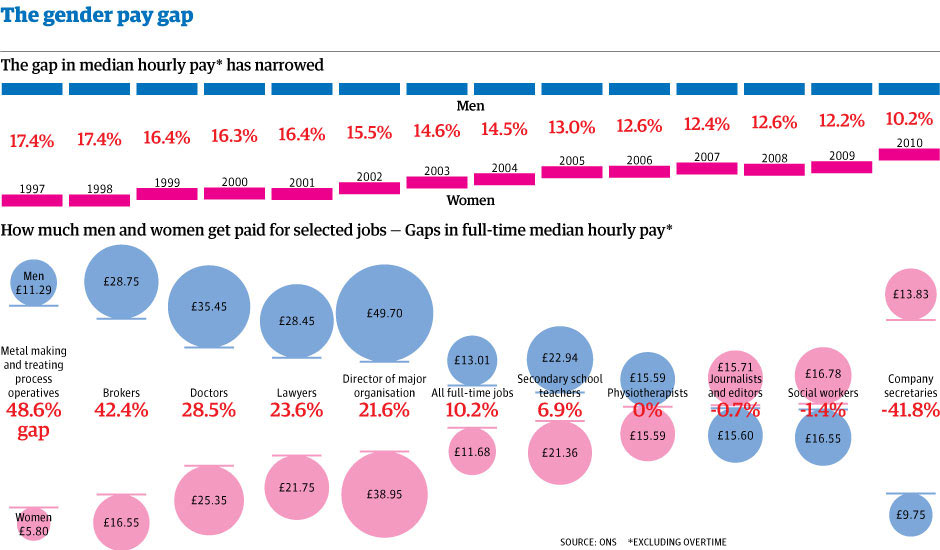Gender Differences in Employment in the United Kingdom
 Equal pay legislation was introduced in the Gender Equality in the Gender Equality in the United Kingdom over 40 years ago. Gender equality legislation was further reinforced by the 2007 Gender Equality Duty applying to all public bodies and aspects of the 2010 Equality Act. However, the UK still has a long way to go in order to achieve equality in workplace. The Wage Gaps Between Men and Women one of the highest in the European Union and women are underrepresented in the higher paid, more powerful positions. This despite the fact that 57% of first degree graduates from UK universities in 2009 and 2010 were women ILM report 2010, Ambition and Gender at Work, p. 1 and that women make up half of the UK workforce.
Equal pay legislation was introduced in the Gender Equality in the Gender Equality in the United Kingdom over 40 years ago. Gender equality legislation was further reinforced by the 2007 Gender Equality Duty applying to all public bodies and aspects of the 2010 Equality Act. However, the UK still has a long way to go in order to achieve equality in workplace. The Wage Gaps Between Men and Women one of the highest in the European Union and women are underrepresented in the higher paid, more powerful positions. This despite the fact that 57% of first degree graduates from UK universities in 2009 and 2010 were women ILM report 2010, Ambition and Gender at Work, p. 1 and that women make up half of the UK workforce.
The wage gap
Latest findings taken from the Office for National Statistics for 2010 show that women earn significantly less than men. As the graphic below reveals, the gap in median hourly pay has gradually declined, from around 17% at the end of the 90s to 10.2% in 2010.
There are also specific domains in which men have a much higher salary than women, for example, in metal manufacturing (49% gap), financial services (42% gap), senior health care positions (23% gap) and even hairdressing. Gaps are lower or virtually inexistent only in a few areas such as education, journalism and social work. Women secretaries earn 42% more than men doing the same job. When looking at top management level positions, men earn 22% more than women.
The size of the pay gap varies across the UK. It is highest in London and lowest in Wales and Northern Ireland. Pay gaps also tend to be higher where average pay is higher in general because in these places the high paid jobs are dominated by men, stretching the size of the gap. Fawcett Society 2010, The Pay Gap by Occupation and Region, p.1

The “Glass Ceiling”
According to a survey carried out in 2010 by the Institute of Leadership and Management, 73% of women believe that the glass ceiling still exists, preventing women from reaching senior management and top-level positions. Conversely, only 38% of men felt that this barrier still existed. The Guardian March 2011, “Women still face a glass ceiling”
A recent report by former minister Lord Davies of Abersoch revealed that nearly half of all FTSE 250 companies did not have a single woman on their executive boards. Indeed, women made up only 12.5% of directors in the FTSE 100 companies, 18 of which had no female directors at all. BBC News Feb 2011, “Davies Report calls for more women in the boardroom” The report has called upon these companies to increase the percentage of women on their executive boards to 25% by 2015, asking them to put into place their own voluntary measures to increased representation and to disclose information on specific measures and figures on the proportion of women.
Why the gap?
There are various reasons as to why such gender differences exist in the U.K. The Fawcett Society which lobbies for Gender Equality cite for example:
- The Motherhood + Career = Success?: negative attitudes towards women’s mothering and caring roles
- Discrimination
- The under-evaluation of women’s worth caused by outdated stereotypes and traditions
- A higher proportion of women in low-paid, part-time jobs, in many cases, forced to work part-time due to childcare and other care obligations
- The recession worsening economic inequalities
It would seem that stereotypes still exist in the UK and that they are continuing to have an effect on culture and attitudes in the workplace. Women remain restricted in their career and, in many cases, forced to make the choice between a successful career and family life. Additionally, it has been found that women have lower career ambitions from the outset, limiting their work objectives and are lacking in confidence compared to their male counterparts. These factors represent both consequences of and reasons for the continuing gender differences in employment.
Solutions
In order to overcome these gender differences and close the gap solutions include:
- Recognising the economic potential that women represent to the UK economy
- Promoting awareness and education in the workplace and amongst the population more generally in order to tackle inequality
- Improving the implementation of Equal Pay Legislation
- Obliging businesses to publish and disclose information on the representation and salaries of both sexes within their workplace
- Extending the possibility of flexible working hours and pay for women with childcare obligations
Although the recent report by Lord Davies does not call for the implementation of quotas, the possibility has been debated. On the one hand, people evoke the success that these kinds of measures have had in other countries such as Spain and Norway . On the other, introducing quotas is considered too extreme and it is argued that businesses should be encouraged to voluntarily work towards making gender equality a top priority.
In conclusion, it would seem that the UK still has a long way to go in order to close the gender gap in the workplace. However, all is not negative. A report by the London School of Economics has predicted a doubling in young female entrepreneurs over the next decade. Although the reasons behind women’s desires to set up their own ventures stem primarily from the advantage of having more flexibility over their hours and the feeling that being self-employed is a less risky option for them than joining a large organisation. British women, younger women in particular, are proving to be more and more ambitious in the sphere of entrepreneurial activity. K
References
See also
- Gender Equality in the Gender Equality in the United Kingdom
- Gender Equality and Entrepeneurial Spirit
- Women and Employment
- Wage Gaps Between Men and Women
- Sexism and Higher Pay Packets
- Gender Equality in Corporate Boards
- Housewives as non-workers
- Motherhood + Career = Success?
- Modern Women and the Challenges of Motherhood


